Commentary on
Pagoda of Light
Xin, Haonian
Senior Historian; Chief editor of Huang Hua Gang magazine
The famous English poet John Keats once exclaimed, Only the one who regards all hardships in the world as his own can climb upon the zenith of artistry. The protagonist in this story, Mr. Bai Shaohua, in a poem he wrote during his imprisonment, professed yet another truth, set me apart from joy and grief, untainted and pure resolute is my belief 
 only the one who regards all hardships in the world as his own can, as Shaohua writes in another poem (Prison Sentiments), Without hesitation I would dedicate my life
only the one who regards all hardships in the world as his own can, as Shaohua writes in another poem (Prison Sentiments), Without hesitation I would dedicate my life  . In the former case, one seeks to achieve a new realm through hardships; while the latter, he is upholding his dedication to cultivation in hardships. Both are equally important to the soul of human civilization. However, Mr. Bai Shaohuas cultivation in hardship was due to the Chinese Communist Partys irrational persecution. As long as this system is not eliminated, the sufferings of the Chinese people will not end. Mr. Bais cultivation in hardship, therefore, is not only his personal story of cultivation but also a reflection of the hardships faced by our people. It is so that Mr. Bai wrote during his imprisonment, Those who know me know my worries, those who do not wonder what I pursue.
. In the former case, one seeks to achieve a new realm through hardships; while the latter, he is upholding his dedication to cultivation in hardships. Both are equally important to the soul of human civilization. However, Mr. Bai Shaohuas cultivation in hardship was due to the Chinese Communist Partys irrational persecution. As long as this system is not eliminated, the sufferings of the Chinese people will not end. Mr. Bais cultivation in hardship, therefore, is not only his personal story of cultivation but also a reflection of the hardships faced by our people. It is so that Mr. Bai wrote during his imprisonment, Those who know me know my worries, those who do not wonder what I pursue. 
The simple yet powerful writing of the authors has reflected well the stories met by Mr. Bai Shaohuas family as they uphold a truthful and pure path in persevering their belief. While it gives the reader sadness and grief, at a much deeper level it allows one to come to a realization of the true meaning of life.
Zhang, Jian
Former 1989 June 4th Student Democratic Movement Leader
Overseas Chinese Democracy Coalition Annual Conference Leader
Federation for a Democratic China Leader
Democratic China Youth Alliance Leader
Chinese Social Democratic Party Europena Chapter Leader
Pagoda of Light, a story of the tribulations met by a young cultivator Bai Shaohua, touched me deeply, indeed.
Nineteen years ago, I was an avid participant in the June Fourth Democratic Movement. I was chiefly in charge of protecting students. On June 4th, 1989, I was shot thrice on Tiananmen Square. Thereafter, I suffered abduction, physical interrogation, escape and evasion before finally fleeing to France. Throughout that period of time, I worked anonymously, for fear of persecution, at the Yulong Hotel in Beijing, China. It was a stones throw away from the Linglong Pagoda. At that time, there were no other buildings around the Pagoda, nor were there any parks. Looking from afar, the pagoda was a testimony for thousands of years of rain and shine. Standing magnificently, it was a withstanding monument from a history of tears.
Mr. Bai Shaohua studied in Peoples University, across the road from Friendship Hostel where I worked. He had a good education, can be said to be a great student. He had great interests in drawing, painting, and enjoyed a wonderful wife in Ji Lei. In Chinese society today, they would be able to enjoy a blissful, happy life if they only chose to be obedient. They were simply ordinary citizens whove surpassed worldly desires and only wished to cultivate their spirits. However, in a country such as Communist-ruled China, even if you do not participate in politics, politics will knock on your door by itself.
In 1989, countless mainland Chinese citizens, faced with the outrageous killing of students on Tiananmen Square, were infuriated. However, not long after, infuriation turned into helplessness, helplessness turned into numbness, and numbness turned into forget. Without facing such trials personally, it is impossible for most to see the true ruthless nature of the CCP. It is so that a similar persecution campaign against ordinary, kind citizens began in 1999.
Faced with persecution, some retreated. However, even more cultivators did not. With their courage and bravery, they stood up against totalitarianism, persevering and fighting on for their rights to the end.
Throughout Chinese history, Chinese people have always honored truth and righteousness, countless historians have chosen to die than bow down to evil. What Shaohua has done is in fact validating the same truth and righteousnesslike an undefiled lotus blooming out of muddy water or a beautiful plum blossom smiling in the chilling winter. People who choose this path are often left in solitude, and their fate less unfortunate, which reminds me deeply of a saying in the Biblethat the path to eternal life is narrow and few find this path; the path to eternal destruction is broad and many fall on that path.
The Peoples University where Bai Shaohua studied has its school motto engraved on its front gate: be real and realistic. However, it is impossible to imagine the pain and hardship to protect that real-ness in a materialistic and anti-cultural modern China. Sometimes, one even has to sacrifice ones life. Mr. Bai fought to protect this truth, illuminating darkness and ultimately becoming a thorn in the flesh to the dark side. As a result, he suffered throughout his prison years all forms of attacks by the dark side to change him, as futile as it may be. But remember, the darker his environment is, the brighter he will shineto validate truthfulness, compassion and beauty behold.
You will not find overt heroics or catchphrases in this biography. In fact, most of his drawings are simply pictures of smiling children. Yet they display his inner realms of peace and purity. Remember, they were completed in a dedicated labor camp for Falun Gong practitioners created by the CCP. Faced with torture and cruelty, being able to maintain ones compassion and Forbearance is a cultivation like no other just like how steel has to be forged from the flames, and the phoenix will rise from the ashes.
Being an exile due to the Tiananmen Incident, I can deeply appreciate Shaohuas experiences. Faced with enemies all around youenemies who, like hungry lions, pounce on any food that they can find. At this time, any slight backstep that you take is helping the evil accomplish their heinous deeds. In pursing truth, there is no retreatone can only march on forwards.
In these times, everything around you will be dark even in daylight. Yet, a true warrior frets not this darkness. He thinks it. For only through the black eyes given to him by darkness, can he use it to find the light.
I pray for Shaohua. Believeat the end of darkness is where light residesthe light of freedom. Such is the law of the universe, and the eternal hope of humanity.
Fang, Han
Director of Global Reporting department of the Epoch Times
In disintegrating evil, compassion demonstrates its dignity;
In breaking through lies, truth displays its power;
In surpassing persecution, faith reveals its eternity.
In modern Chinese history, the totalitarian CCP government has often taken the role of the protagonist. However, in this biography, one will find that such a party that has used the most base actions ever in human history, whether ancient or modern, Chinese or foreign, and employed all the most malicious means suddenly becomes powerless in the face of a Falun Gong practitioner, the protagonist Bai Shaohua. Indeed, all its physical and psychological tortures were all in vain. The CCP has launched the state-led persecution against millions of Falun Gong practitioners. However, in the end, it has only become a minor role in the dramatic historic event which expresses the truth of One righteous mind can subdue one hundred evils.

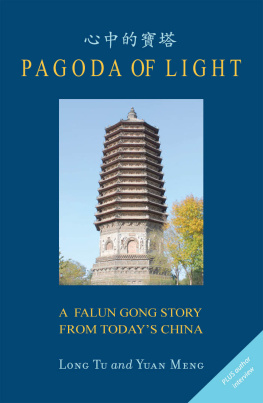
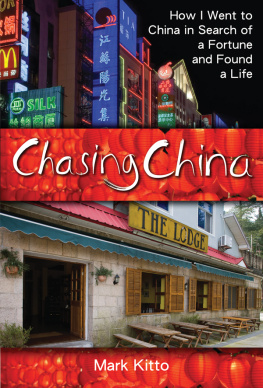
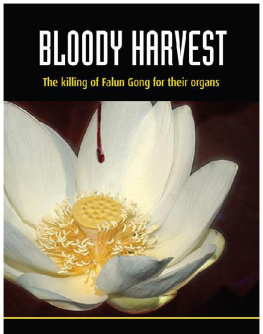

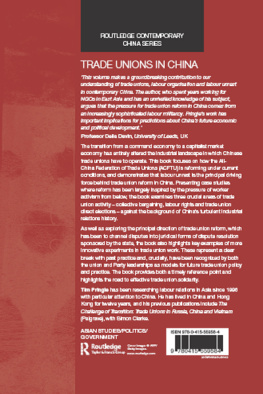
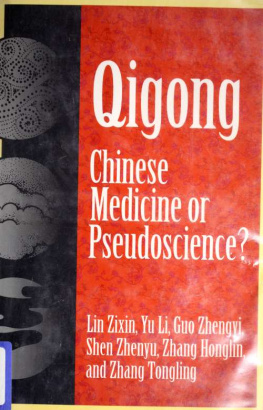
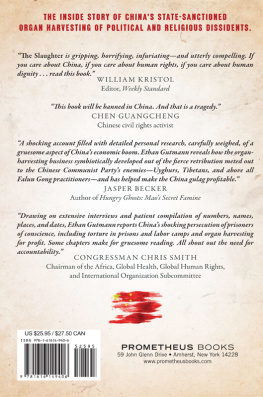


 only the one who regards all hardships in the world as his own can, as Shaohua writes in another poem (Prison Sentiments), Without hesitation I would dedicate my life
only the one who regards all hardships in the world as his own can, as Shaohua writes in another poem (Prison Sentiments), Without hesitation I would dedicate my life  . In the former case, one seeks to achieve a new realm through hardships; while the latter, he is upholding his dedication to cultivation in hardships. Both are equally important to the soul of human civilization. However, Mr. Bai Shaohuas cultivation in hardship was due to the Chinese Communist Partys irrational persecution. As long as this system is not eliminated, the sufferings of the Chinese people will not end. Mr. Bais cultivation in hardship, therefore, is not only his personal story of cultivation but also a reflection of the hardships faced by our people. It is so that Mr. Bai wrote during his imprisonment, Those who know me know my worries, those who do not wonder what I pursue.
. In the former case, one seeks to achieve a new realm through hardships; while the latter, he is upholding his dedication to cultivation in hardships. Both are equally important to the soul of human civilization. However, Mr. Bai Shaohuas cultivation in hardship was due to the Chinese Communist Partys irrational persecution. As long as this system is not eliminated, the sufferings of the Chinese people will not end. Mr. Bais cultivation in hardship, therefore, is not only his personal story of cultivation but also a reflection of the hardships faced by our people. It is so that Mr. Bai wrote during his imprisonment, Those who know me know my worries, those who do not wonder what I pursue. 